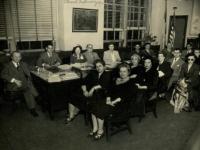In an unprecedented collaboration, three Philadelphia-based cultural organizations will co-host a webcast of “Puerto Rico Aquí y Allá: a multidisciplinary symposium bringing U.S. and island-based scholars into dialogue about the Puerto Rican diaspora.
The symposium is a joint presentation of the Smithsonian and the Universidad del Turabo. The webcast will be presented on Thursday, November 5 from 2:00 – 6:30 pm at the Historical Society of Pennsylvania.
The webcast will be followed by a facilitated conversation with Professor Victor Vazquez-Hernandez, a tenured professor in History and Chair of the Social Sciences Department, Miami Dade College-Wolfson Campus. Free and open to the public, the webcast will also be American Sign Language-interpreted. The event will be conducted in English and Spanish, with simultaneous translation from Spanish available.
Held at the Museo y Centro de Estudios Humanísticos at the Universidad del Turabo in Gurabo, Puerto Rico, the webcast will be streamed live at http://museo.ut.pr/centro-de-estudios/puerto-rico-aqui-y-alla/.
In addition to the event in Philadelphia, several Smithsonian Affiliate partners will be hosting viewings of the event and concurrent discussions about the issues raised in the symposium and the particular relevance to their communities, including the Orange County Regional History Center in Orlando, FL; the Institute of Texan Cultures in San Antonio, TX; Framingham State University in Framingham, MA; the African American Museum in Philadelphia, PA; and the North Carolina Museum of History in Raleigh will participate in this initiative. This symposium received Federal support from the Latino Initiatives Pool, administered by Smithsonian Latino Center.
For more information including a detailed agenda and speaker bios, please contact Jennifer Brundage at brundagej@si.edu or 202.633.5306.
About The African American Museum in Philadelphia:
Founded in 1976 in celebration of the nation’s Bicentennial, the African American Museum in Philadelphia (AAMP) is the first institution funded and built by a major municipality to preserve, interpret and exhibit the heritage African Americans. The museum objectively interprets and presents the achievements and aspirations of African Americans from pre-colonial times to the current day. AAMP serves as a gathering place for both young and old as well as a forum for broader community engagement, and a partner for collaborative initiatives with historical and cultural institutions.
About Taller Puertorriqueno
Taller Puertorriqueño (Taller) has been “Building Community through Art Since 1974”. Known as “The Cultural Heart of Latino Philadelphia,” Taller is a community-based multidisciplinary arts organization whose work bridges European, African, Caribbean and Latino societies and cultures. Taller’s programs work at the nexus of arts, culture, human rights, and social advocacy to catalyze social change towards community advancement. Taller offers programs for youth and adults, operates art galleries featuring Latin@ artists, the region’s only bilingual bookstore, sponsors musical and theater events, and organizes a range of engaging cultural art education programs.
About the Historical Society of Pennsylvania
Founded in 1824 in Philadelphia, the Historical Society of Pennsylvania inspires people to create a better future through historical understanding. One of the oldest historical societies in the United States, HSP is home to some 600,000 printed items and more than 21 million manuscript and graphic items. Its unparalleled collections encompass more than 350 years of America’s history—from its 17th-century origins to the contributions of its most recent immigrants. HSP remarkable holdings together with its educational programming make it one of the nation’s most important special collections libraries: a center of historical documentation and study, education, and engagement. HSP has become a chief center for the documentation and study of ethnic communities and immigrant experiences.
About the Smithsonian Latino Center
The Smithsonian Latino Center was created in 1997 to promote Latino presence within the Smithsonian. The Center is not represented in one physical location; rather, it works collaboratively with the Institution's museums and research centers, ensuring that the contributions of the Latino community in the arts, history, national culture and scientific achievement are explored, presented, celebrated and preserved. We support scholarly research, exhibitions, public and educational programs, web-based content and virtual platforms, and collections and archives. We also manage leadership and professional development programs for Latino youth, emerging scholars and museum professionals.
About Smithsonian Affiliations
Smithsonian Affiliations, established in 1996, is designed to facilitate a two-way relationship among Smithsonian Affiliates and the Smithsonian to increase discovery and inspire lifelong learning in communities across America. The program establishes long-term partnerships with museums, education, and cultural organizations to facilitate the loan of Smithsonian artifacts and traveling exhibitions, as well as to develop innovative educational collaborations locally and nationally. There are more than 200 Smithsonian Affiliates in nearly every state, Puerto Rico and Panama. Affiliates represent the diversity of America’s museum community—size, location and subject—and serve all audiences.
About the Universidad del Turabo
The vision of the University of Turabo is to be a high-quality educational community dedicated to improving the education of its student population while focusing on internationalization and promoting the use of advanced technology. In 1981, the University opened the Museo y Centro de Estudios Humanísticos to collect, preserve, study and disseminate the artistic and humanistic expression of Puerto Rican cultural heritage, for the benefit and enjoyment of the university and community audiences.

